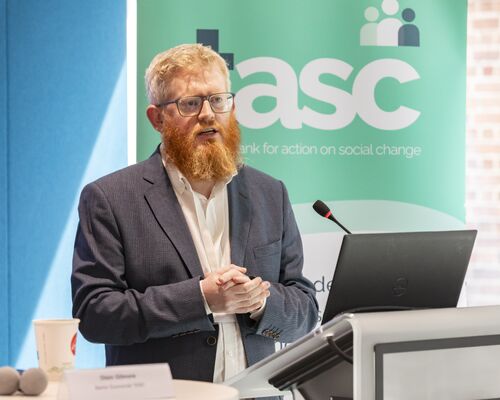New Research Warns EU Minimum Wage Directive Faces Legal Threat, Undermining Social Europe Goals

There is a looming threat to workers’ rights across Europe.
This is the stark warning from a new report by TASC, the Think-Tank for Action on Social Change.
Launched on the afternoon of April 29th at the European Parliament Liaison Office in Ireland, The EU Minimum Wage Directive and the Battle for Social Europe drew a big audience –including TDs, journalists, Department of Enterprise officials, academics, students, and union representatives.
The EU’s Adequate Minimum Wages Directive (AMWD) is now in serious jeopardy, according to the report. A legal challenge currently before the European Court of Justice (ECJ) could annul the directive– a move that would derail progress on fair pay, undermine efforts to tackle in-work poverty, and weaken collective bargaining across the Union.
The directive has delivered meaningful results since its adoption in 2022 – driving wage increases across multiple EU countries, encouraging governments to expand collective bargaining rights, and reinforcing the EU’s social agenda. In Ireland alone, minimum wages have risen by 34% since 2020, with further gains expected as the government works toward meeting the directive’s benchmark of 60% of the median wage.

TASC's Mike Jennings speaking at the launch of the report. His message is clear: a grave threat looms for Social Europe. (Photo by Cian Redmond)
But that momentum is now at risk. Denmark, with backing from Sweden, has launched a legal challenge against the directive, arguing that the EU has overstepped its authority. In a serious blow to the directive’s future, ECJ Advocate General Nicholas Emiliou issued an opinion in January recommending that it be annulled in full.
EU Court Case Could Threaten Workers’ Rights, Report Warns
TASC’s report, written by Senior Economist Oisín Gilmore and commissioned by ICTU, SIPTU, and the Financial Services Union, argues that such a ruling would deliver a significant blow to Social Europe. It would severely limit the EU’s ability to combat in-work poverty, reduce inequality, and restore public trust in European institutions.
Speaking at the event, Gilmore assessed that if the ECJ were to adopt Advocate General Emiliou’s reasoning, it would not only undermine the directive but could also cast doubt on the legal foundation of other key EU rights, such as the right to annual paid leave and pay replacement for maternity leave.

Gilmore in conversation with Sinn Féin TD Rose Conway-Walsh. Speaking later at the event, she highlighted the importance of the report. (Photo by Cian Redmond)
During his presentation on Tuesday afternoon, report author Oisín Gilmore highlighted that many of the socioeconomic issues driving discontent and populism – such as low pay and economic insecurity – require strong action at the EU level. He argued that the directive is a crucial tool for rebuilding trust in European integration by delivering tangible improvements in living standards and labour rights.
In his concluding remarks, Gilmore made it clear: “Such an outcome would erode trust in the EU’s ability to deliver on the promises of social justice and economic fairness that underpin its legitimacy.”
Union Leaders and Politicians Urge EU to Defend Social Protections
ICTU General Secretary Owen Reidy also addressed the audience at the European Parliament Liaison Office. He urged the court to reject the case, pointing out the problems that would come if the directive were annulled, as mentioned in the report.
However if the case is not rejected, Reidy emphasised that both Ireland and the European Union must keep on prioritising tackling low wages and in-work poverty. “To this end, governments here and across Europe must strengthen trade union rights and promote collective bargaining by improving union access to workplaces, implementing protections against union-busting, and safeguarding union representatives from discrimination.”

ICTU General Secretary Owen Reidy addressing the crowd at the European Liaison Office, expressing his support for the report’s findings.(Photo by Cian Redmond)
Other speakers at the event included Professor Roland Erne, who specialises in European Integration and Employment Relations at UCD; Labour TD for Dublin Central, Marie Sherlock; and Sinn Féin TD and Spokesperson on Enterprise, Tourism and Employment, Rose Conway-Walsh. They all highlighted the importance of the report and the potentially grim future Europe could face if the directive were to be annulled.
In a round table discussion after the event, many of the attendees supported the report's findings, stressing the need for stronger protections for workers and the importance of collective bargaining.
Read the full report: https://www.tasc.ie/publications/the-eu-minimum-wage-directive-and-the-battle-for-social-euro/